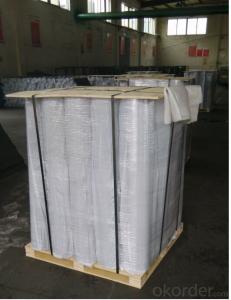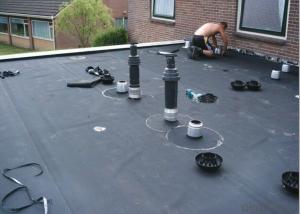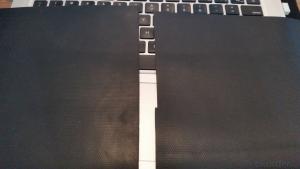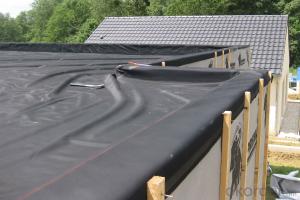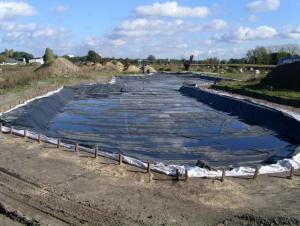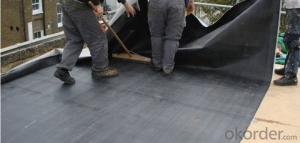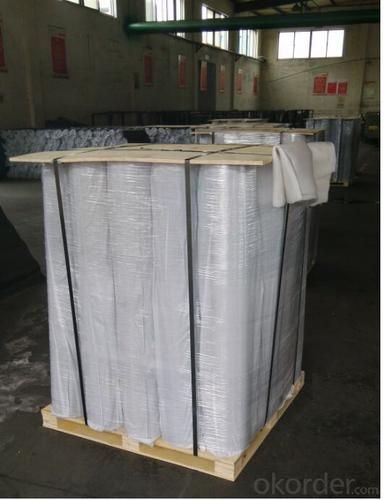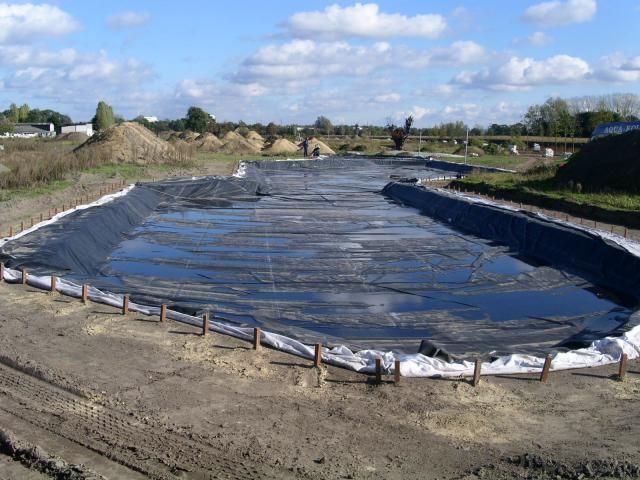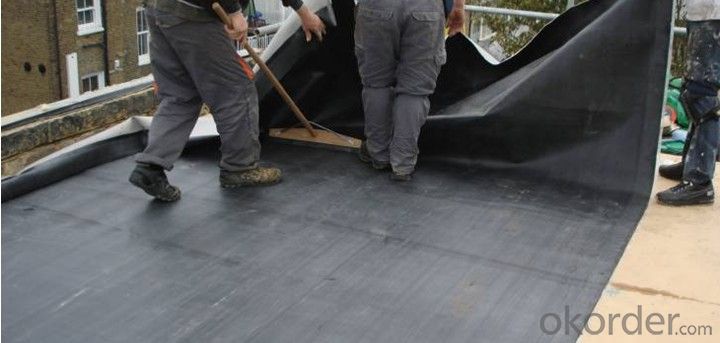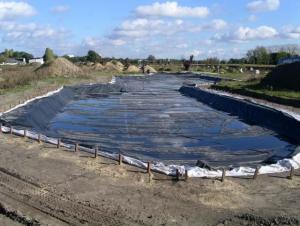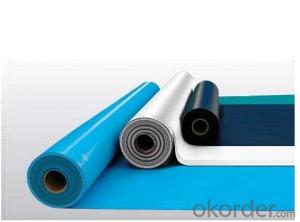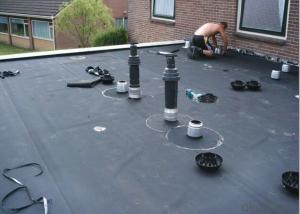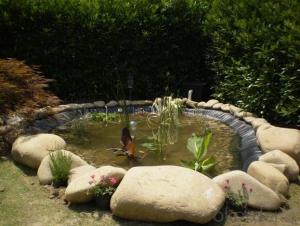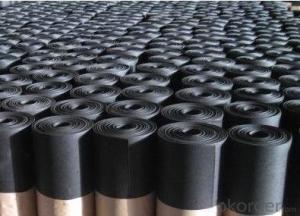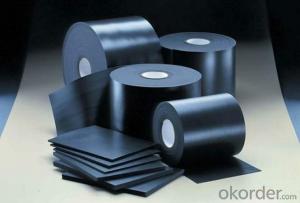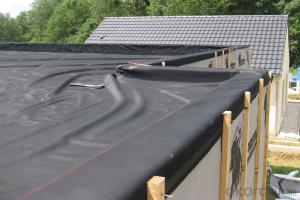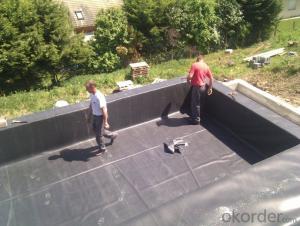EPDM Reinforced Waterproof Membrane with Customized Thickness
- Loading Port:
- Shanghai
- Payment Terms:
- TT OR LC
- Min Order Qty:
- 50000 m²
- Supply Capability:
- 5000000 m²/month
OKorder Service Pledge
OKorder Financial Service
You Might Also Like
EPDM Reinforced Waterproof Membrane with Customized Thickness
Description Of EPDM Reinforced Waterproof Membrane with Customized Thickness:
1. Excellent physical and mechanical performance, high tearing resistance;good deformation adaptability, high puncture resistance;
2. High aging resistance, high UV resistance, anti-acid & alkali;
3. Excellent low & high temperature resistance, innocuous, long life span;
4. Perfect water proof performance, seepage and humidity resistance.
Main Features of EPDM Reinforced Waterproof Membrane with Customized Thickness:
A.Polyester based SBS Modified Bitumen Waterproofing Membrane
a. Strong impermeability
b. High tensile strength, elongation, ability to adapt the grassroots shrinkage deformation and cracking
c. Puncture-resistant, broken resistant, tear-resistant
d. The corrosion resistance, resistance to mildew, weathering good
e. Construction convenient, hot-melt can be operated Four Seasons Construction, reliable joints
B. Fiberglass based SBS Modified Bitumen Waterproofing Membrane
a. High tensile strength, stability of a good size
b. High Temperature good performance
c. Damage resistance, corrosion resistance, resistance to mildew, weathering good performance
d. Good construction performance, reliable joints.
Specifications of EPDM Reinforced Waterproof Membrane with Customized Thickness:
| Material | EPDM Rubber |
| Size | 1.2m (width)*20m (length) or customized, weldable type 2.05m or 4m width |
| Thick | 1.2mm, 1.5mm, 2.0mm |
| Type | Vulcanized & Weldable |
| Pattern | Non-reinforced (homogeneous) |
| Certificate | ISO9001/14001 |
Applications of EPDM Reinforced Waterproof Membrane with Customized Thickness:
geomembrane used in groundsill of road, highway, railway and waterproof layer of swelling clay and wet collapsed loess.Geomembrane can be widely used in areas of garbage burying, waste disposal and underground construction projects.such as below:
- aquaculture ponds
- Ouchi root barrier membrane
- Floating baffles;
- Process wastewater
- Stormwater impoundments;
- Secondary containment;
- Spill containment
- Manure and biogas tanks and covers
- Potable water tanks and covers;
- Sludge Drying beds;
- Bioremediation covers & liners;
- Leachate ponds
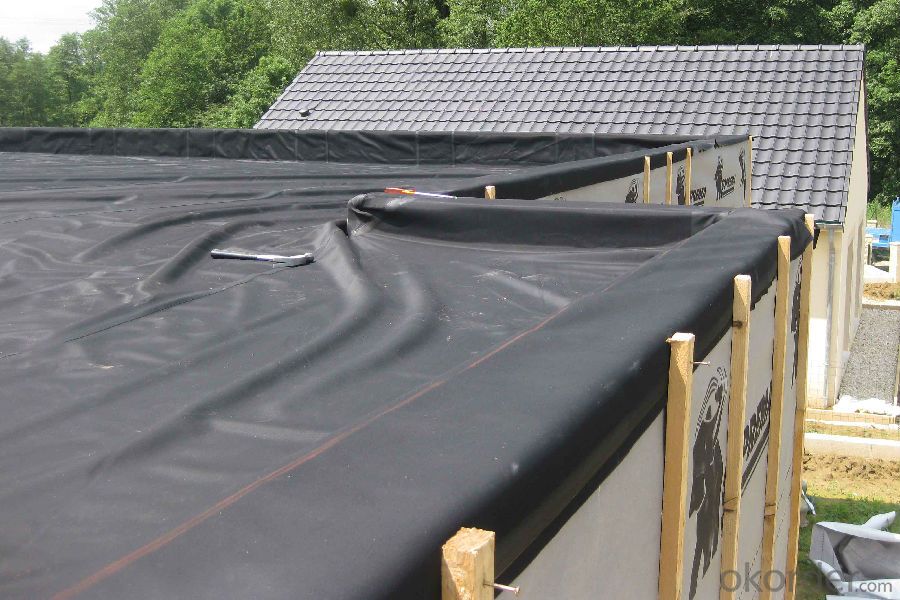
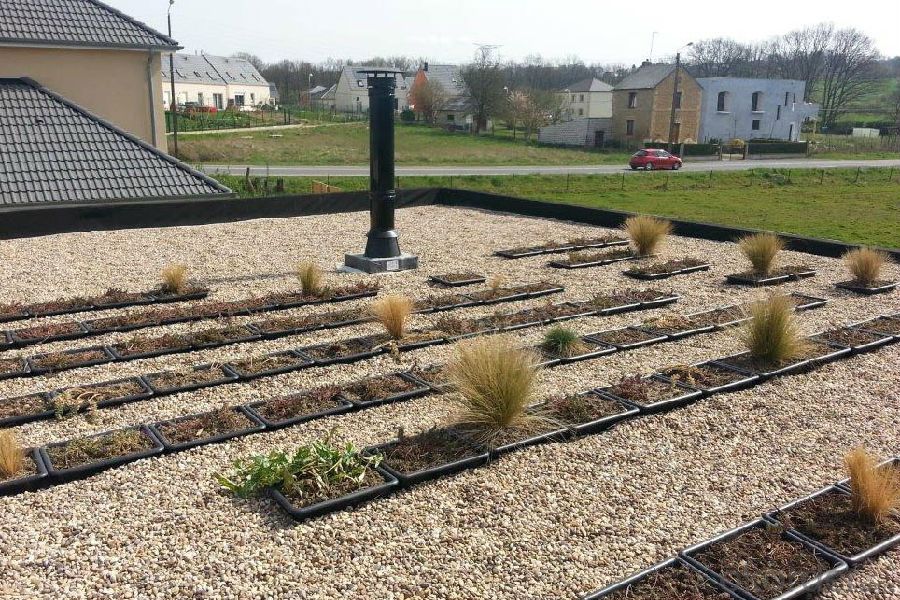
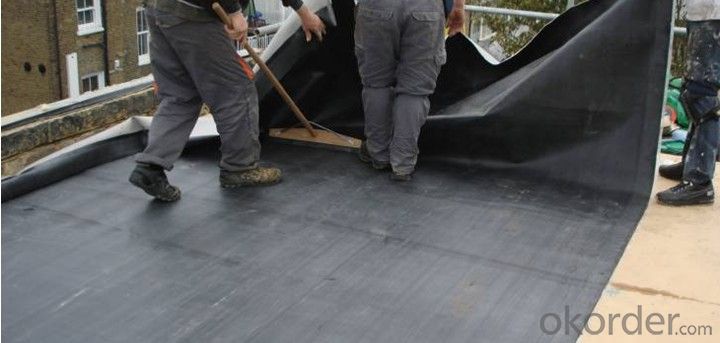
IMages of EPDM Reinforced Waterproof Membrane with Customized Thickness:
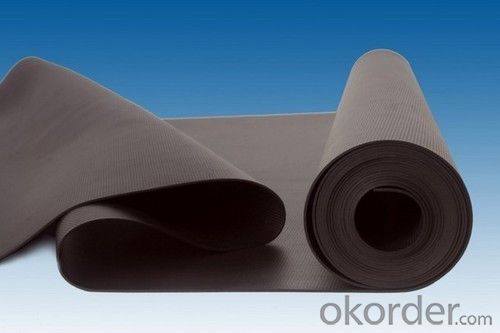
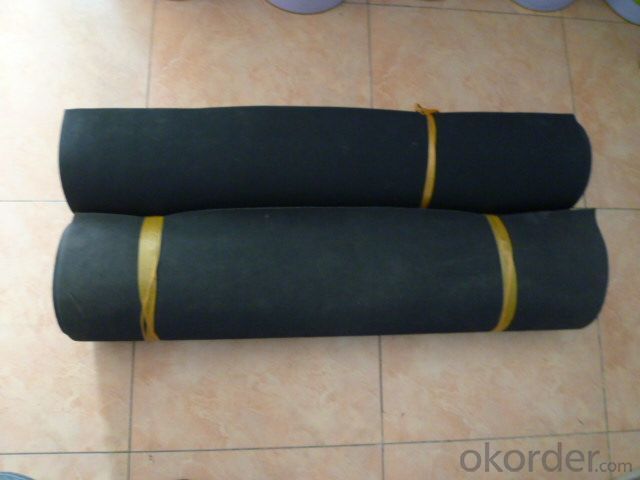
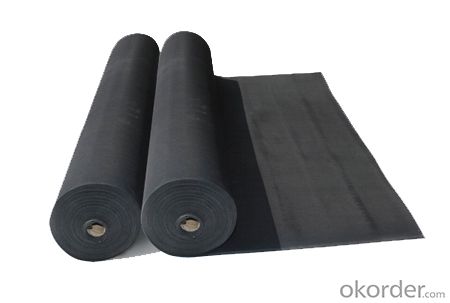
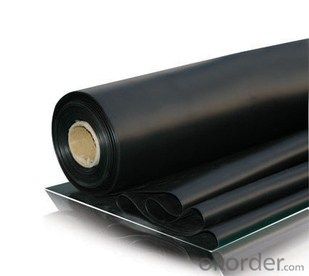
FAQ of EPDM Reinforced Waterproof Membrane with Customized Thickness:
1. What are we supplying?
We are specialized in producing Colorful Asphalt Roof Shingle, SBS/APP modified bitumen waterproof membrane, Self adhesive bitumen waterproof membrane, PVC waterproofing membrane, EPDM rubber roofing membrane, Single Component Polyurethane Waterproof Coating, and Spray Polyurea Waterproof Coating
.
2. How Many years experience do we have?
We have been exported to more than 20 countries in the past 15 years.
3. How long do we usually reply your request?
We always reply our customer within 24 hours.
- Q: Can a waterproofing membrane be used for underground storage facilities?
- Yes, a waterproofing membrane can be used for underground storage facilities. Waterproofing membranes are designed to prevent water infiltration, making them an ideal solution for underground structures such as storage facilities. These membranes are typically made from materials such as bitumen, rubber, or polyethylene, which are highly resistant to water penetration. By installing a waterproofing membrane on the walls and floor of an underground storage facility, it helps to create a barrier that prevents water from seeping in, protecting the stored goods from moisture damage. Additionally, waterproofing membranes also help to prevent the growth of mold and mildew, which can be detrimental to the integrity of the structure and the items stored within. Overall, using a waterproofing membrane is a reliable and effective way to ensure the durability and longevity of an underground storage facility.
- Q: 1.2 thick synthetic polymer waterproofing membrane two weight how to count
- Different materials of the coil its unit weight is not the same, and some polymer membrane with self-adhesive or empty shop, without adhesive, so according to the specific material and paste method for calculation, the above calculation, the exact calculation can be based on the actual The material was measured for its weight per unit weight and then the lap coefficient and binder were calculated.
- Q: Can a waterproofing membrane be used for underground parking structures?
- Underground parking structures face a high risk of water infiltration because of their location and exposure to groundwater. To prevent potential damage, a waterproofing membrane is commonly used. These membranes act as a protective barrier, effectively stopping water from penetrating the structure and causing harm. Typically, they are applied to the exterior walls and floors of the underground parking structure to ensure a secure seal. In addition to safeguarding against water, these membranes also help prevent problems like mold growth, corrosion, and concrete deterioration caused by moisture. Thus, incorporating a waterproofing membrane is crucial for maintaining the long-term durability and functionality of underground parking structures.
- Q: Can a waterproofing membrane be used for elevator pits and sump pits?
- Elevator pits and sump pits, commonly prone to water leakage and moisture problems, can benefit from the use of a waterproofing membrane. These membranes are designed to resist water penetration and create a barrier against water intrusion, effectively sealing the pits. Materials such as rubberized asphalt, EPDM, or PVC are typically used to construct these membranes, which are then applied to the walls and floors of the pits. The installation of a waterproofing membrane provides protection to the elevator and sump pits, safeguarding them against water damage, including corrosion, mold growth, and structural deterioration. This not only ensures the functionality and durability of the pits but also creates a safe and healthy environment for occupants and equipment. Nevertheless, it is essential to consider the specific requirements and regulations of elevator and sump pit installations, as different jurisdictions may have their own codes and standards that must be adhered to. Furthermore, proper installation and regular maintenance of the waterproofing membrane are crucial to guarantee its effectiveness in preventing water infiltration.
- Q: What kind of waterproofing membrane, waterproofing membrane is how to classify their respective advantages?
- TPO waterproofing membrane: strictly speaking TPO waterproofing membrane is EPDM (EPDM) and PVC combination, most of the performance are lower than EPDM.
- Q: Can a waterproofing membrane be used on modified bitumen roofs?
- Yes, a waterproofing membrane can be used on modified bitumen roofs. In fact, it is a common practice to install a waterproofing membrane over modified bitumen roofs to provide an additional layer of protection against water infiltration. This is especially important in areas with heavy rainfall or where the roof is prone to frequent exposure to water. The waterproofing membrane helps to seal any potential cracks or gaps in the modified bitumen roofing system, preventing water from seeping through and causing damage to the underlying structure. Additionally, the waterproofing membrane can also enhance the overall durability and longevity of the roof by protecting it from the harmful effects of moisture.
- Q: Can a waterproofing membrane be used for a school building foundation?
- A school building foundation can indeed utilize a waterproofing membrane. These membranes are specifically created to safeguard structures by preventing water from infiltrating. They are commonly employed in various construction scenarios, including building foundations. By applying a waterproofing membrane to the foundation walls, it can effectively shield the building from water-related harm and prevent issues caused by moisture, such as mold, decay, and structural damage. This is especially crucial for school buildings due to their extensive foundations and the possibility of heavy usage and water exposure. Thus, the use of a waterproofing membrane is a viable solution to ensure the durability and structural soundness of the school building foundation.
- Q: Is a waterproofing membrane resistant to punctures or tears?
- A waterproofing membrane is created to resist punctures or tears, being made from robust materials like PVC, TPO, or EPDM, renowned for their strength and damage resistance. These membranes undergo extensive testing to ensure they can endure different environmental conditions and potential causes of punctures or tears, like sharp objects or heavy foot traffic. Some waterproofing membranes even have reinforcement layers or added protection to further strengthen their resistance to punctures and tears. Nevertheless, it is crucial to note that while waterproofing membranes are highly durable, they are not entirely immune to damage. Proper installation, regular maintenance, and avoiding unnecessary stress or impact on the membrane can help extend its lifespan and enhance its performance.
- Q: Are there any specific building code requirements for waterproofing membranes?
- Waterproofing membranes are subject to specific building code requirements. These requirements vary depending on the jurisdiction, but most codes mandate that waterproofing membranes meet certain standards and specifications. The purpose of these requirements is to protect buildings from water damage and maintain the safety and integrity of the structure. Some typical building code requirements for waterproofing membranes include: 1. Material standards: The building code may stipulate the type of materials that are permissible for waterproofing membranes. This can include specifications for the membrane's type, such as liquid-applied or sheet membranes, as well as requirements for thickness and composition. 2. Installation standards: The building code may provide specific instructions and techniques for installing waterproofing membranes. This can include requirements for appropriate surface preparation, application procedures, and details concerning penetrations and transitions. 3. Testing and certification: Building codes may mandate that waterproofing membranes undergo certain tests and meet specific performance criteria. This can include tests for water penetration resistance, durability, and compatibility with other building materials. In some cases, the code may require certification from a recognized testing laboratory. 4. Code compliance documentation: Building codes often demand that waterproofing membranes be installed in accordance with approved plans and specifications. This means that contractors may need to submit documentation to demonstrate compliance with the code, such as product data sheets, manufacturer's installation instructions, and details of the proposed waterproofing system. It is crucial to consult the local building code or regulatory authority to ascertain the specific requirements for waterproofing membranes in a particular jurisdiction. Complying with these requirements is vital to ensure the proper functioning and longevity of the waterproofing system and to prevent issues like water intrusion, mold growth, and structural damage.
- Q: Can a waterproofing membrane be used on insulation surfaces?
- Yes, a waterproofing membrane can be used on insulation surfaces. It provides an additional layer of protection to prevent moisture infiltration and damage to the insulation material.
Send your message to us
EPDM Reinforced Waterproof Membrane with Customized Thickness
- Loading Port:
- Shanghai
- Payment Terms:
- TT OR LC
- Min Order Qty:
- 50000 m²
- Supply Capability:
- 5000000 m²/month
OKorder Service Pledge
OKorder Financial Service
Similar products
Hot products
Hot Searches
Related keywords
